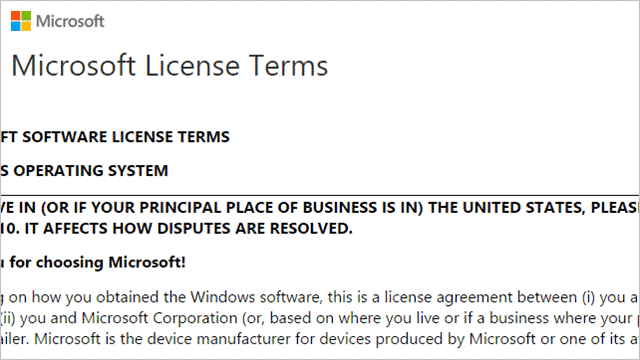
If you believe everything on the Internet, you know that Microsoft, like Google and Apple, is an evil conglomerate that only wants to track you everywhere you go and control every aspect of how you use a computer. Some of this is true, some of it’s not, and the rest is up to you to decide what to do with.
Recently, Microsoft has come under fire for updates to its End User License Agreement (EULA) since the release of Windows 10. Users in Europe noticed it first, and it’s caused alarm among users across the globe.
We look at the issue and whether you need to be worried about using Windows 10.
Also Read: All You Need to Know About Microsoft Edge, the Internet Explorer Replacement
What Exactly Changed in the Windows EULA That Has Everyone Freaking Out?
The part causing the most controversy related to Microsoft being able to scan your computer for pirated software and apps. The way the language reads in the EULA, you seem to be giving Microsoft permission to scan everything on your PC and then disable pirated software and apps when doing so.
The section everyone is referring to is this, located in section 7B of the Windows 10 EULA:
“We may automatically check your version of the software and download software updates or configuration changes, including those that prevent you from accessing the Services, playing counterfeit games, or using unauthorized hardware peripheral devices.”
However, Microsoft has released clarification on this issue, stating that you are actually giving them permission to scan Microsoft-related software and apps.
For example, if you are using pirated software on Xbox Live or Windows Store content, then Microsoft can scan and disable it. That’s the only software and apps Microsoft has any control over in the new EULA and conspiracy theorists seem to be blowing the EULA update out of proportion.
Now, there’s not telling whether Microsoft will be able to disable pirated games, which have been an issue on Windows since its inception. With the addition of the Xbox Gaming App, Microsoft is looking to nail you down Xbox Live Core Services as opposed to gaming experiences everywhere. As long as you’re using licensed games, you’re safe; there’s no clarification from Microsoft about how third-party games will be affected by the EULA update.
The rest of your software and apps, however obtained, should be safe from Microsoft’s prying eyes according to the company themselves.
What Else Changed in the Windows EULA?
There’s a couple of other changes to the Windows EULA users should be aware of, including activation of non-genuine Windows licenses, transfer rights, downgrade rights, and update rights.
Microsoft towed the line with allowing non-genuine copies of Windows to be upgraded and activated with Windows 10. According to the latest updates to the EULA, you are allowed to upgrade to Windows 10 from a non-genuine Windows license but this will not make your license genuine. If you upgrade from a non-genuine version of Windows, you’re just asking for Microsoft to shut you down in the future.
Transfer rights haven’t changed much in Windows 10, except to note how the Windows 10 license is tied to the device if you upgraded from Windows 7 or 8. If you’ve bought a retail copy, you can still transfer that licenses from computer-to-computer once you’ve removed Windows 10 from the computer it was originally installed on when the license was bought.
Downgrade rights have always been part of the Windows experience but now they’re time limited. Until support runs out for the previous version you’re downgrading to, you can downgrade. Once support ends, you can no longer downgrade despite having a valid license to do so.
While pushing Windows as a service, Windows 10 forces users to take part in automatic updates. You no longer have control over how updates occur. Only business customers will have access to advanced control over Windows Update in Windows 10.
Torrent Sites Banning Windows 10 and Windows 10 Users
Many torrent sites are banning Windows 10 and users utilizing the OS on their sites to cut down on issues related to piracy.
While many torrent sites are used for perfectly legal reasons, let’s be honest and realize that many of them and their users are utilizing them to download everything from pirated theatrical released to new music on Tuesdays to games they don’t want to spend hundreds of dollars on.
Conclusion
Most users don’t read the EULA of anything they do, and they really should. You never know what might be changing, like this, with Microsoft and Windows 10. The above changes won’t affect the majority of Windows 10 users, except the ones doing something wrong.
Whether you pirate software or not, you’re the one risking not just your OS potentially but you risk being fined or jailed for doing so. Again, the risk is yours, and Microsoft is just trying to cut down on piracy as related to Microsoft software and apps.







